
You’ve just arrived in the Rocky Mountains and are awestruck by the rugged, natural beauty that surrounds you.
You’ve mapped out all the trails you plan to hike and are eager to get on with the adventure when, suddenly, you begin to feel nauseous. You lose your appetite, and are dizzy and short of breath. What a time to get sick!
The problem may be altitude sickness. Anyone who travels from lower altitudes to above 6,000 – 8,000 feet (2829 – 2438 m) could experience altitude sickness, according to the Centers for Disease Control, one of the major operating components of the U.S. Department of Health and Human Services.
Altitude sickness is caused by a lack of oxygen in the thin mountain air. It can be serious, and even life-threatening.
Symptoms of Altitude Sickness

The symptoms usually begin about six hours after arrival at high elevation, but they can also appear after 36 hours or later.
Symptoms usually go away by the fourth day at high altitude. They may include nausea, vomiting, loss of appetite, dizziness, shortness of breath, generalized weakness, rapid heartbeat and insomnia.
Worsening symptoms (which usually occur at very high altitudes, above 11,000 feet (3,000 m) include an intense, constant headache, confusion, coughing and bloodstained sputum, a blue tinge to nails, lips and skin and difficulty breathing.
A lack of oxygen in the blood can cause fluid to leak from the capillary walls into the brain or lungs. If left untreated, a severe case of altitude sickness can cause unconsciousness and death within hours.
Why You Need International Travel Insurance When You Travel
Ways to Decrease Your Risk of Altitude Sickness

- Ascend slowly (984 feet/300 m a day) to give yourself time to acclimate. (For example, if you’re going to the Colorado Rocky Mountains, stay in Denver a day or two before ascending into the high country.)
- Drink plenty of water and stay hydrated.
- Descend to a lower elevation if mild symptoms occur. Give your body time to acclimate before heading back into higher country.
- Talk with your doctor about taking acetazolamide (Diamox) or nifedipine to prevent altitude sickness (although there is no guarantee it will help). Avoid alcohol or depressant drugs, such as tranquilizers and sleeping pills, as this can make things worse.
- Allow your body a day or two of rest before strenuous exercise.
- Eat a high-calorie diet while at high altitude. (This is a great excuse to eat!)
- A homeopathic remedy mentioned in the Rough Guide to Travel Health is coca (30c), taken once daily. If symptoms are severe, descend immediately and take coca three or four times a day.
- According to the Centers for Disease Control, ginkgo biloba, if taken before ascent, has been shown to reduce symptoms of altitude sickness.
- Seek medical attention if symptoms become severe.
If you have a medical condition such as sickle cell anemia, congestive heart failure, angina or any pulmonary disorders, contact your doctor before traveling to a high-altitude area.
Be prepared to acclimate slowly and wisely (using the above techniques). Stay aware of how your body responds to the altitude, and act accordingly.
Keeping these simple guidelines in mind will help you enjoy your stay in the high country, wherever that may be. Happy Trails!
Travel insurance is essential for any trip, offering peace of mind and protection. Explore options with SafetyWing or SquareMouth to find the coverage you need.
Inspire your next adventure with our articles below:
Want to discover more hidden gems and helpful travel tips? Join our free newsletter for the latest travel secrets and travel articles.
We are reader-supported and may earn a commission on purchases made through links in this article.
- What is Altitude Sickness and How Can You Avoid it? - June 18, 2025
- Cinnamon Bay Campgrounds, U.S. Virgin Islands - January 10, 2021
- Colorful Colonia del Sacramento, Uruguay - January 9, 2021

